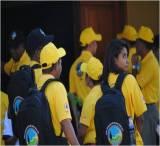Pilot Census prepares Census of 2015

The General Directorate for Statistics conducted, between July 11th and July 25th, a Pilot Census aiming at preparing the Census of 2015.
The Pilot Census was held in eight districts (Dili, Ermera, Baucau, Lautem, Manufahi, Bobonaro, Covalima and Manatuto), of the 13 that make up Timor-Leste, having been hired about 100 people in order to perform it.
For 2015, there will be more than five thousand and two hundred (5.200) contracts, for the accomplishment of the Census “given it is conducted door-to-door, in every house in Timor-Leste”, explained the General Director for Statistics, António Freitas. “For those who have the opportunity to participate in this project we will give three weeks of training.That will provide them not only the knowledge but also temporary employment which may mean an opportunity of permanent work in the future due to the experience they will acquire”, he added.
The completion of the Census is essential to a real knowledge on the number of people living in the country and on their living places, as the census will not only be populational but also residential. With the data collected, the Government may outline the near future of the country, in terms of residential, birth and economic policies, at regional and even at global levels. It is, therefore, one of the most important tools for the organization of a State.
The General Census of the Population and Housing, allows, for example, the State to accomplish with goals set forth at national level (such as the Government Program or the Strategic Development Plan), and international (such as the Millennium Development Goals).
Furthermore, the Census of 2010, has already allowed the Government to adjust policies and measures, taking into account the real perception of the living population of Timor-Leste, of its distribution and housing conditions. “We realized, for example, which places were already provided with electricity supply. A service that has enjoyed great development with the construction of the Electrical Plants of Hera and Betano, and the supply of alternative energies in the most remote areas. The Census of 2010 allowed us to accurately understand what was done, how and what needed to be done”, explained the General Director for Statistics.
It also allowed to encourage and engage the communities in the joint development effort, through the completion of the Sensus Fo Fila Fali - a publication with the profile of each one of the 442 sucos existing in the country, which serve as a reference for community leaders "because they contain comparative data on their sucos and the district, and even the country. And also about their potential and greater challenges. This lets them know what they can and should do in order to develop the community ", he added.
As a rule, set out by the United Nations Statistics Division, the census takes place every ten years. But since Timor-Leste is a young country, which denotes a "rapid development it is important for the State to accomplish these censuses with a shorter periodicity. But there are other countries that do the census every five years, as the United States of America, Australia or Japan", said the General Director for Statistics. The Government has decided to conduct the Census in 2015, and the next in 2020.
The legislation defining this measure was approved by the Council of Ministers on the 25th of March this year. "This Decree-Law normatively frames the periodic holding of censuses, defining the entities responsible for the implementation, the procedures for funding and the mechanisms ensuring the confidentiality of the collected information", concluded the General Director for Statistics, António Freitas.










































